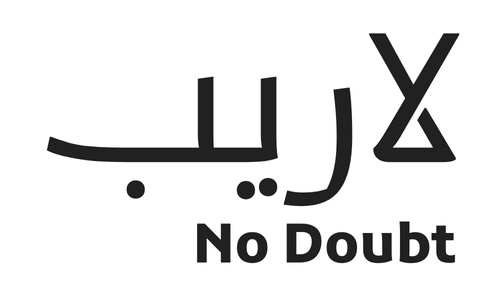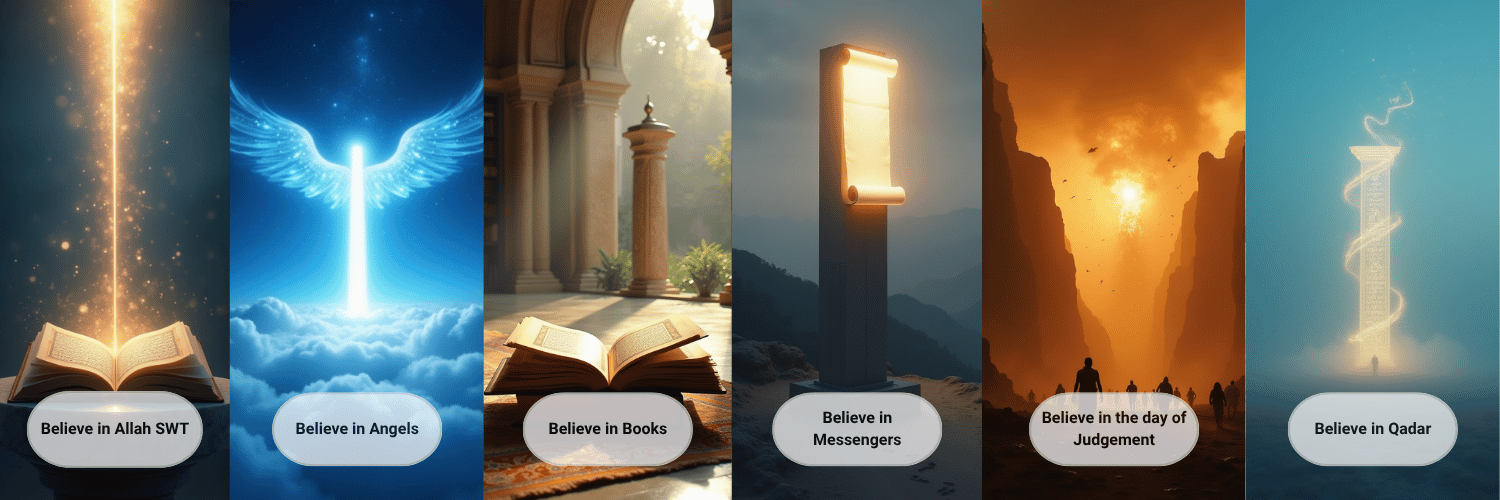The Pillars of Iman: The Foundation of a Muslim's Faith
بِسْمِ اللهِ الرَّحْمٰنِ الرَّحِيمِ
In the name of God, the Most Gracious, the Most Merciful.
The pillars of Iman are the 6 foundational beliefs that form the core of a Muslim’s faith (aqeedah). These articles of faith, rooted in the Qur’an and Sunnah, define a believer’s worldview and shape their relationship with Allah.
The authority for these pillars comes directly from the teachings of our beloved Prophet Muḥammad (صلى الله عليه وسلم), most famously in the Ḥadith of Jibril, where the angel asked him about Iman. The Prophet (صلى الله عليه وسلم) replied:
“…that you believe in Allah, His angels, His Books, His Messengers, the Last Day, and in Divine Decree, its good and its bad…”
Reference:
– Sahih al – Bukhari, Book of Iman (Book 2), Hadith 50.
– Sahih Muslim, Book of Iman, Hadith 1 (or 8)
Have you ever wondered how these beliefs connect to your daily actions and inner peace? Let’s explore them together.
The Source of Our Belief: Understanding the Hadith of Jibril
Just as the Pillars of Islam describe the fundamental actions of faith, the Pillars of Iman outline its essential beliefs.
The 6 pillars of Iman are not arbitrary; they are divinely revealed and form the very essence of a Muslim’s creed (aqeedah). Their primary definition comes from one of the most comprehensive hadith in our tradition, the Hadith of Jibril. This narration provides the foundational framework for understanding not just faith, but the entire religion of Islam.
What is the Hadith of Jibril?
This powerful hadith, narrated by ‘Umar ibn al-Khattab (may Allah be pleased with him), describes an event where a man of stunning appearance and immaculate clothing appeared before the Prophet Muhammad (صلى الله عليه وسلم) and his companions. The man sat before the Prophet (صلى الله عليه وسلم) and asked him a series of profound questions about the core of the religion. The companions later learned that this visitor was none other than the Angel Jibril (Gabriel), who had come to teach them their deen.
In this hadith, Jibril (as) asked,
“Inform me about Iman (faith).” The Prophet (صلى الله عليه وسلم) replied, “It is to believe in Allah, His angels, His books, His messengers, and the Last Day, and to believe in divine decree (Qadar), both its good and its evil.”
Sahih Muslim, Book of Iman, Hadith 1
This direct answer from the Prophet (صلى الله عليه وسلم) gives us the undisputed, six-point definition of Iman.
Defining Iman, Islam, and Ihsan
The Hadith of Jibril also beautifully distinguishes between three core dimensions of our religion:
- Islam: The outward actions and submission. The Prophet (صلى الله عليه وسلم) defined this by the five pillars of Islam: the testimony of faith (Shahadah), establishing prayer (Salah), giving charity (Zakat), fasting Ramadan (Sawm), and making pilgrimage (Hajj). These are the outward actions we perform, actions whose acceptance depends on the sincerity of our inward Iman.
- Iman: The inward beliefs and conviction. These are the six pillars of faith discussed in this article. This is what we believe in our hearts.
- Ihsan (Excellence): The highest level of consciousness of Allah (سبحانه وتعالى). The Prophet (صلى الله عليه وسلم) defined it as “to worship Allah (سبحانه وتعالى) as if you see Him, and if you do not see Him, then you know that He sees you.” This is the state of mind and soul that beautifies our actions and beliefs.
Together, Iman, Islam, and Ihsan form the complete structure of a believer’s life – a sincere heart (Iman) leading to righteous actions (Islam), all performed with the highest spiritual awareness (Ihsan).
A Detailed Look at the Six Pillars of Iman

The six pillars of Iman are deeply interconnected. They build upon one another to create a comprehensive worldview that provides clarity, purpose, and solace to the believer. Let’s explore each one.
Belief in Allah (Al-Iman bi-Allah) - The Core of Faith
This is the cornerstone upon which all other pillars rest. Belief in Allah is not merely an intellectual acknowledgment; it is an internalized conviction that encompasses four key aspects:
- Belief in His Existence: A firm conviction that Allah (سبحانه وتعالى) is the one, true Creator, and Sustainer of the universe.
- Belief in His Lordship (Rububiyyah): Accepting that He alone is the Lord, who creates, provides, gives life and death, and controls all of creation.
- Belief in His Right to be Worshipped (Uluhiyyah): The understanding that because He is the Lord, He alone deserves our worship. This is the essence of Tawhid (the Oneness of Allah), and it means directing all acts of worship, like prayer, supplication, and sacrifice, to Him alone.
- Belief in His Names and Attributes (Al-Asma wa-s-Sifat): To affirm the names and attributes Allah (سبحانه وتعالى) has described for Himself in the Qur’an or through His Prophet (صلى الله عليه وسلم), without distortion, denial, or comparison to His creation. As Allah (سبحانه وتعالى) says,
“…There is nothing like Him, for He ˹alone˺ is the All-Hearing, All-Seeing.”
Quran 42:11 (Surah Ash-Shura, ayah 11)
For a comprehensive exploration of this core principle, you can read our
Belief in the Angels (Al-Iman bi-l-Mala’ikah) - The Unseen Messengers
Angels are beings of the unseen (ghayb) world, created by Allah (سبحانه وتعالى) from light (Sahih Muslim 2996). They are His honored servants who obey His commands without fault. Belief in them includes:
- Their Existence: Affirming that they are a real part of Allah’s creation.
- Their Names and Roles: Believing in the ones Allah has named, such as Jibril (who delivers revelation), Mika’il (in charge of rain and vegetation), and Israfil (who will blow the trumpet on the Last Day).
- Their Attributes: Understanding that angels are part of Allah’s creation, created from light. They are honored servants (‘ibad mukramun), not divine, and they never disobey Allah (سبحانه وتعالى)’s command.
This belief connects us to the unseen and helps us appreciate the magnificent order of the universe that Allah (سبحانه وتعالى) manages through His obedient servants.
Belief in the Revealed Books (Al-Iman bi-l-Kutub) - Divine Guidance for Humanity
Out of His mercy, Allah (سبحانه وتعالى) sent down books as a source of guidance for humanity. Belief in the books means accepting that they are the word of Allah, revealed to His messengers. This includes:
- Belief in the Books Mentioned: We believe in the books Allah (سبحانه وتعالى) named in the Qur’an, such as the Scrolls of Ibrahim (Suhuf), the Torah (Tawrat) given to Musa, the Psalms (Zabur) given to Dawud, and the Gospel (Injeel) given to ‘Isa.
- Belief in the Qur’an as the Final Revelation: We believe the Qur’an is the final, complete, and preserved word of Allah. It is the ultimate source of guidance for all of humanity until the Day of Judgement. Allah (سبحانه وتعالى) Himself promises,
“It is certainly We Who have revealed the Reminder, and it is certainly We Who will preserve it“
Qur’an 15:9 (Surah Al-Hijr, Ayah 9)
To truly fulfill this pillar, a Muslim must not only believe in the Qur’an but also strive to read, understand, and implement its teachings in their life. To learn more about implementing this, consider starting with a simple plan for daily Quran reading.
Belief in the Prophets & Messengers (Al-Iman bi-r-Rusul) - The Chosen Guides
A Messenger (Rasul) is one sent with a new divine message, often with a new law (Shari‘ah), while a Prophet (Nabi) follows and revives an existing one. Every messenger was a prophet, but not every prophet was a messenger. Our belief includes:
- Affirming All Messengers: We believe that Allah sent messengers to every nation to guide them to the worship of Him alone. The Qur’an mentions 25 by name, but we believe in all of them, whether named or not.
- Belief in Prophet Muhammad (صلى الله عليه وسلم) as the Final Messenger: A core part of our faith is believing that Prophet Muhammad (صلى الله عليه وسلم) is the “Seal of the Prophets,” the final messenger sent to all of humanity.
Following Their Guidance: True belief in the messengers means accepting their teachings and obeying their commands, as they spoke on behalf of Allah (سبحانه وتعالى).
Belief in the Day of Judgement (Al-Iman bi-l-Yawm al-Akhir) - The Ultimate Accountability
This pillar encompasses all that will happen after death. It is the belief that this life is a temporary test, and we will all be resurrected to be held accountable for our deeds. It includes belief in:
- The Trial of the Grave: The questioning by the angels Munkar and Nakir.
- The Resurrection (Al-Ba’th): When all of humanity will be brought back to life.
- The Gathering and Judgement: When we will stand before Allah, and our deeds and their recorded intentions will be weighed on the scales (Mizan).
- The Final Abode: The ultimate reality of Paradise (Jannah) for the believers and Hellfire (Jahannam) for the disbelievers.
This belief instills a powerful sense of purpose and accountability. It encourages good deeds and discourages sin, reminding us that justice will ultimately prevail.
Belief in Divine Decree (Al-Iman bi-l-Qadar) - Trusting Allah’s Plan
Belief in Qadar brings peace, not by avoiding hardship, but by accepting it as part of Allah’s wise decree. It is a concept that brings immense peace when understood correctly. It comprises four levels:
-
- Knowledge (Al-‘Ilm): Allah (سبحانه وتعالى)’s knowledge is perfect and encompasses everything from the past, present, and future.
- The Written Decree (Al-Kitabah): Allah (سبحانه وتعالى) wrote down everything that would happen in the Preserved Tablet (Al-Lawh al-Mahfuz) before creation.
- The Will (Al-Mashi’ah): Nothing happens except by the will and permission of Allah.
- The Creation (Al-Khalq): The Creation (Al-Khalq): Allah is the Creator of all things, including our faculties and actions, while granting every human a genuine, yet subordinate, will (mashi’ah). Thus we choose freely, but always within His supreme decree; this balances the Ahl-al-Sunnah path between Jabariyyah compulsion and Qadariyyah denial.
Crucially, this does not negate human free will. Allah (سبحانه وتعالى) has given us the ability to choose, and we are responsible for our choices. Belief in Qadar empowers the believer with patience during trials and gratitude in blessings; rather, it is a source of strength. When something good happens, we are grateful to Allah (سبحانه وتعالى). When we face hardship, we are patient, knowing it is part of a divine plan beyond our comprehension, and we trust in His wisdom.
Why are the Pillars of Iman Important?
The six pillars of Iman are the very foundation of a Muslim’s identity. They are not just abstract theological concepts; they are the lens through which a believer sees the world. They provide:
- A Clear Purpose: Understanding why we are here (to worship Allah (سبحانه وتعالى)) and where we are going (the Hereafter).
- A Moral Compass: Belief in Allah, His books, and His messengers provides us with a clear understanding of right and wrong.
- Resilience and Peace: Belief in Qadar gives a believer incredible strength during hardship and humility during ease. It removes anxiety about the future and regret about the past.
- A Direct Connection to the Divine: These pillars connect us to our Creator, the unseen world, and the long history of humanity’s guidance, giving our lives profound meaning.
Practical Steps to Strengthen Your Iman in Daily Life

Iman is not static; it increases with acts of obedience and decreases with acts of disobedience. Nurturing it is a lifelong journey. Here are some practical ways to strengthen your connection to these pillars.
Gaining Knowledge ('Ilm)
The more you learn about Allah (سبحانه وتعالى), His names, and His attributes, the stronger your faith will become. Actively seek knowledge about each of the 6 pillars. Read books, listen to lectures, and ask scholars. Knowledge is the antidote to doubt.
Reflecting on the Qur'an (Tadabbur)
The Qur’an is the primary source that speaks about all six pillars. Don’t just read the words; ponder their meanings. When Allah describes the angels, the Day of Judgment, or His own magnificence, pause and reflect on those verses. Let the words of Allah (سبحانه وتعالى) penetrate your heart.
Remembering Allah (Dhikr)
Constantly remember Allah (سبحانه وتعالى) through supplications (dua), praise (tasbih), and seeking His forgiveness (istighfar). Dhikr keeps the heart alive and polished, making it more receptive to the truths of Iman. The Prophet (صلى الله عليه وسلم) said that
Iman wears out just as a garment does, so we should ask Allah (سبحانه وتعالى) to renew the faith in our hearts.
Performing Righteous Deeds
Every sincere good deed is a reflection and enhancer of Iman and a means of strengthening it. When you act upon your belief, you are reinforcing it. The relationship is cyclical: strong Iman leads to good deeds, and good deeds increase Iman.
Download Your Checklist
We have put the essentials on one clear page – fast, pray, dhikr, charity, for you to print or save on your phone.
Frequently Asked Questions -The 6 Pillars of Iman
1. What are the 6 pillars of Iman and why are they important?
The 6 pillars of Iman are:
-
- Belief in Allah (سبحانه وتعالى)
- His Angels
- His Revealed Books
- His Messengers
- the Day of Judgment
- Divine Decree (Qadar).
They are important because they form the foundational creed (aqeedah) of a Muslim, providing a clear purpose, moral compass, and a framework for understanding life and the Hereafter.
2. How is Iman different from Islam?
Iman refers to the inward beliefs held in the heart (the six pillars of faith). Islam refers to the outward actions of submission (the five pillars of practice like prayer and fasting). True faith requires both; sincere Iman in the heart should manifest as righteous Islamic actions.
3. Which pillar of Iman covers destiny (Qadar)?
The sixth pillar, Belief in Divine Decree (Al-Iman bi-l-Qadar), covers the concept of destiny. It is the belief that everything that happens, good or bad, is by the perfect knowledge, will, and creation of Allah (سبحانه وتعالى), and was written in the Preserved Tablet before creation.
4. What Qur'an verse mentions all six articles of faith?
While the pillars are famously defined in the Hadith of Jibril, a verse that comprehensively covers the core beliefs is Surah Al-Baqarah, Ayah 285. It mentions belief in Allah (سبحانه وتعالى), His Angels, His Books, and His Messengers, while the Last Day and Qadar are explained in other verses and are consolidated by the Hadith of Jibril.
5. How can I strengthen my Iman in everyday life?
You can strengthen your Iman through four key practices:
- Seeking authentic Islamic knowledge.
- Consistently reading and reflecting upon the Qur’an (Tadabbur).
- Engaging in the regular remembrance of Allah (سبحانه وتعالى) (Dhikr).
- Performing righteous deeds, both big and small.
6. Does belief in Qadar mean we don't have free will?
No, belief in Qadar does not negate free will. Allah (سبحانه وتعالى) has given humans the capacity to choose their actions, and they will be held accountable for those choices. Qadar means that Allah (سبحانه وتعالى)’s knowledge is all-encompassing and nothing happens outside of His will, but this does not remove our personal responsibility.
7. Why must we believe in the unseen (ghayb)?
Belief in the unseen is a fundamental test of faith. It demonstrates our trust in Allah (سبحانه وتعالى)’s revelation over our own limited perception. Believing in things like Angels, Jannah, Jahannam, and the soul’s existence after death separates a believer from one who only accepts what can be physically observed.
8. What is the difference between a Prophet (Nabi) and a Messenger (Rasul)?
A Messenger (Rasul) was sent with a new divine law or shari’ah. A Prophet (Nabi) was sent to follow and teach the law of the messenger who came before him. Therefore, every Messenger is also a Prophet, but not every Prophet is a Messenger.
9. What breaks or nullifies Iman?
Iman can be nullified by major disbelief (kufr) or major shirk (associating partners with Allah (سبحانه وتعالى)). This includes actions like denying any of the six pillars, mocking the religion, or directing an act of worship to someone or something other than Allah (سبحانه وتعالى).
10. Do the pillars of Iman have to be accepted all together?
Yes, the six pillars of Iman are an indivisible set of beliefs. To be a true believer, one must accept all six pillars completely. Denying any of the six pillars knowingly and intentionally constitutes disbelief (kufr) as per scholarly consensus.

